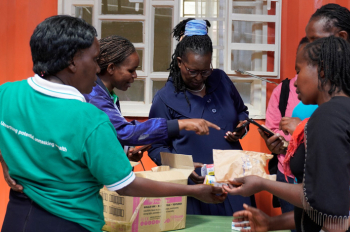
As the Keswick Convention celebrates its 150th anniversary this year, the historic gathering has reaffirmed its calling to gospel-centered transformation while embracing its growing influence on the global church. Under the theme “Transformed,” this year’s event highlights both continuity and change—faithful to its spiritual roots yet increasingly relevant to a diverse, interconnected world.
Held annually in the picturesque Lake District of northern England, the 2025 Keswick Convention is expected to draw more than 14,000 participants over three weeks, including 3,500 children and young people. It is the largest convention in Keswick’s history, held from July 12 to August 1, and aims to bring renewed spiritual vitality through the preaching of God’s Word, Christlike discipleship, and a strong emphasis on mission.
“What Keswick is really about,” says Rev. Jonathan Lamb, Minister-at-Large for Keswick Ministries, “is life transformation and the call to Christlikeness in every area of life that is founded on God’s Word, that is appropriate to the culture, and embedded in the local church.”
In an exclusive interview with Christian Daily International, Lamb—who previously served as CEO and now oversees Keswick’s international partnerships—spoke candidly about the convention’s historic legacy, expanding global influence, and its forward-looking vision to engage a rising generation in a rapidly shifting world.
A movement transformed by the gospel
The word “transformation” is more than just a theme for the 150th celebration—it captures the essence of what the Keswick Convention has always sought to promote: a changed life through a living encounter with Jesus Christ. At the heart of the movement is a longing for spiritual depth and renewal.
This commitment is rooted in Keswick’s foundational emphasis on biblical teaching. Three principles define its mission: hearing God’s Word, becoming like God’s Son, and serving God’s mission.
“Hearing God’s Word is a commitment to understand what the Bible is teaching,” Lamb explains. “Becoming like God’s Son is the result. And if you’re hearing God’s Word and becoming like God’s Son, that should lead to serving God’s mission.”
This theological framework continues to shape the lives of attendees and fuel the international expansion of Keswick-style gatherings around the globe.
Reaching a new generation
One of the most striking features of the 2025 convention is the strong presence of young people—children, students, and young adults—not only attending but also leading.
Keswick Ministries has worked intentionally to adapt to generational shifts. While holiness and discipleship remain core values, the convention now emphasizes the concept of “Christlikeness,” a term Lamb notes resonates more clearly with today’s audience.
“Holiness is a biblical word and a good word,” he says, “but it may not feel so accessible for the younger generation. So we talk about ‘becoming like Christ,’ which people understand perhaps rather more.”
Leadership opportunities are provided to younger Christians who have grown up attending the convention. Many now volunteer during the summer, mentoring others and guiding programs they once participated in.
“We have an awful lot of younger leaders,” Lamb says. “Loads of volunteers, particularly students who have often been involved themselves as children. And then they come and give leadership to all of those tracks.”
Keswick Unconventional—a creative strand of the convention—engages youth and adults alike through art, drama, music, and media. It reflects a wider effort to remain culturally relevant while staying rooted in the unchanging gospel.
A global family of faith
Though the convention began in the small Cumbrian town of Keswick in 1875, it has long since become a global movement. Today, more than 90 Keswick-related events are held in 15 to 16 countries, from the Pacific to East Asia, Africa to the Caribbean.
“So overall, it’s probably reaching about 60,000 believers at all these events,” Lamb estimates.
Australia is home to six major Keswick-style conventions, some of which are as large—or larger—than the UK gathering. New Zealand also hosts a smaller event. Other notable examples include Uganda, where a long-standing group in Kampala continues to thrive, and Calcutta, where believers are navigating mission amid increasing social and political pressures.
In Finland, Keswick-style gatherings have continued for over a century. Hungary has developed a “very vibrant” ministry, and in the Caribbean, believers gather under the Keswick banner in Trinidad, Jamaica, and the Cayman Islands.
The Japanese expression of the movement, known as Japan Keswick, has developed a distinct brand and hosts eight or nine regional events every February. Lamb highlights its unifying role in a country where Christians are few in number.
“It’s probably one of the few things that brings Christians together in Japan,” he says. “The Japanese Christian population is really quite small. So this is an event that occurs in different cities all the way up every February, and it’s been going for about 70 years now.”
While some groups retain the Keswick name, others use more locally recognizable names, such as Belgrave Heights Convention outside Melbourne. What unites them, Lamb says, is the shared commitment to Christ, Scripture, and mission.
Remembering the roots
Keswick’s origin story is both humble and visionary. In 1875, during a period of spiritual dryness in the English church, Canon Thomas Dundas Hartford-Battersby and his Quaker friend Robert Wilson organized a three-day gathering for “the promotion of practical holiness.” Using the parsonage lawn and a large tent, they invited believers from various church backgrounds. Around 400 people attended.
“The church was becoming fairly dry, with a dry orthodoxy,” Lamb recalls. “It wasn’t a vibrant spiritual life for many people. And the vicar of Keswick St. John’s was one of those who felt there must be more to living the Christian life than going through routines.”
Interest grew rapidly. Each subsequent year drew more people until the Keswick Convention became a fixture in the evangelical calendar. With the exception of one wartime hiatus during WWII and a temporary shift online during the COVID-19 pandemic, it has continued annually ever since.
A new pictorial coffee table book, released for the 150th anniversary, tells the story of Keswick’s journey and includes testimonies of people whose lives were changed—some of whom went on to become missionaries, pastors, or leaders in their communities.
Challenges overcome
Keswick’s longevity has not been without difficulties. The 1980s and 1990s posed serious questions about its relevance. At a time when the Christian festival Spring Harvest was gaining traction, Keswick risked being seen as outdated.
“That was one challenge which had to be navigated,” Lamb acknowledges. “It was done through broadening the base of people who were involved from evangelical churches, strengthening the work with families… bringing children, young people, and therefore, whole families. Suddenly, that changed everything.”
Another challenge involved correcting doctrinal misperceptions. Keswick was sometimes associated with the idea of perfectionism—the notion that believers could achieve sinless holiness in this life.
“There were some people who got rather too close to that idea,” Lamb admits. But Keswick’s teaching, especially as clarified by John Stott, maintained that while Christians are called to holiness, they also continue to struggle with sin.
Leadership renewal and structural growth were other hurdles. With increasing attendance, Keswick outgrew its historic venues. The acquisition and redevelopment of the old Derwent Pencils factory has provided a new home—complete with seminar rooms and a 4,000-seat marquee—and a base for year-round ministry.
“I think by God’s grace and the generosity of a lot of people, we were able to buy this new property and the new site, which has enabled us to grow,” says Lamb.
Faithful and contemporary
Looking ahead to Keswick’s next 150 years, Lamb hopes the movement will remain both faithful and contemporary—a phrase often used by his late colleague, Bible teacher John Stott.
“In other words,” Lamb explains, “we want to be faithful to what the Gospel is and what the Bible teaches as true in every generation and in every culture. But we want to be contemporary wherever God has placed us and make sure we’re speaking appropriately to that generation.”
He imagines that the original founders of the 1875 meeting would be “shocked” by the scale, technology, and music of today’s convention. But he believes they would also find much that resonates.
“There’s a notable continuity,” Lamb reflects. “How can we come to know Christ better? How can we be filled with the Holy Spirit to live in a way which honors the Lord? How can we serve him wholeheartedly? Those kinds of things are exactly what they wanted in 1875.”
If the Lord has not returned by 2175, the 300th anniversary, Lamb hopes Keswick will still be proclaiming the same gospel message in ways that speak powerfully to that future generation.
Prayer requests and an invitation
As Keswick Ministries celebrates its milestone, Lamb has three prayer requests for the global church.
First, “that the first things will be kept first.” In other words, that the convention would hold fast to its core priorities and not be distracted by lesser concerns.
Second, that today’s younger generation—facing tremendous cultural upheaval—would remain rooted in Scripture, live out vibrant Christian lives, and engage their societies missionally.
Third, that God would raise up new leaders to carry the work forward, both in the UK and in other countries where Keswick has taken root.
There are also very practical needs, such as caring for children and ensuring high standards in youth programs during the event’s final week.
“But it’s also hugely hopeful,” Lamb says, “that the rising generation of children and young people are coming here, looking for God’s help in their lives. And we’d be glad of prayer that what goes on here would glorify God and would serve those people.”
Finally, Lamb extends a warm invitation: “The Keswick Convention is free of charge. You just have to find somewhere to stay!”
For more information, visit keswickministries.org.






